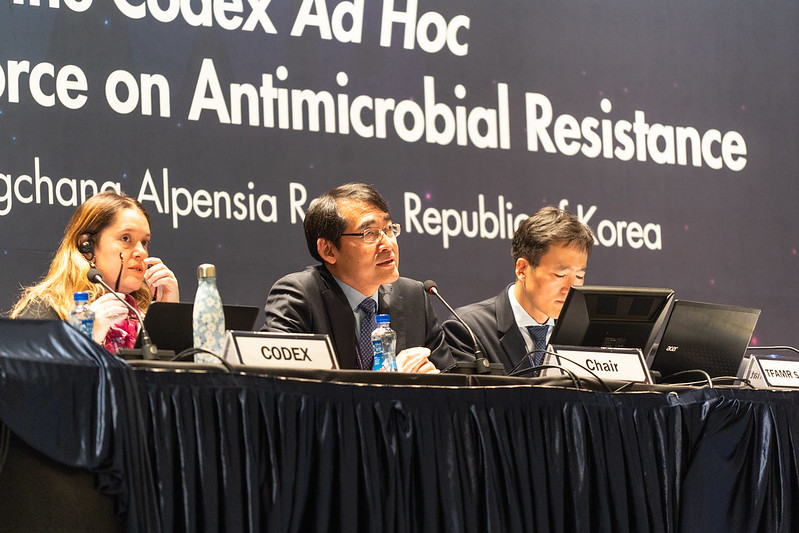No time to waste to conserve antibiotics for future generations
Lee Eui-kyung Minister of Food and Drug Safety, Republic of Korea, opened the Ad hoc Codex Intergovernmental Task Force on Antimicrobial Resistance (AMR), in Pyeongchang, underlining the need for bold action in order to conserve antibiotics for future generations. Minister Lee Eui-kyung urged delegates to move forward on their programme of work and complete the tasks assigned. “It's more crucial to have our recommendations and plans in place, than our plans themselves”, she said.

Dr. Sangryeol Ryu, chairing TFAMR7
Due to the unfortunate ill health of Professor Park, the Republic of Korea has designated Dr. Sangryeol Ryu (centre, above) to chair this 7th session of the task force.

AMR is a worldwide threat to Health, not only for humans, but also for animals and plants, where food security will be threatened also. “Codex Alimentarius is the scenario where we can contribute to minimize this threat through the developed of standards that are implemented”, said Constanza Vergara Escobar, Chile, one of the co-chairpersons that have worked to prepare the texts currently before the task force for discussion.
Chile is “very enthusiastic on moving forward on the step procedure, since we think member countries understand how much we all need to have these standards, not only for combating AMR issues related to food safety, but also to set a framework that will allow us to maintain the fair practices in food trade”, she said.
Haileyesus Getahun Gebreone, WHO said: “Antimicrobial resistance and also the emergence of drug resistant infections is currently posing a great threat for what we have achieved in the last century in human medicine as well as animal health”. Responding in a coordinated manner and also really attacking and also preventing and containing the problem is essential. “That is also why One Health is important”, he said.
The task force on AMR has the goal of drafting two documents to help countries prepare a response to antimicrobial resistance. “When these are completed, this will allow countries to draft their own national legislation”, said Jeff Lejeune FAO. There are two important facts on these documents concerning the Codex texts being prepared. “One is the collaborative nature and transparency that everybody agrees on the on the documents. And the second thing is that they're scientifically based, so they stand the test of time”, he said.
AMR requires champions and leaders.
Sarah Cahill, Codex Secretariat said: “Establishing standards, international standards and anti-microbial resistance requires champions and leaders and the Ministry for Food and Drug Safety [in Korea] has played this role when it comes to Task Force AMR”. The expectation is that within another year “we will successfully conclude new standards and revised standards to help countries around the world address antimicrobial resistance”, she said.
ROK and AMR
The Republic of Korea launched its national action plan in 2016 for protecting public health by optimal use and reduced use of antimicrobials and through control of the spread of drug-resistant bacteria.
Korea’s national action plan includes improving farm sanitation and bio-security for infection prevention and requires a prescription for some critically important antibiotics.
All stakeholders in the food chain, from farm to table are making an effort to tackle AMR.
Read more
Follow the meeting documents on the Codex web site
类别
- (11)
- (3)
- Animal Feed (8)
- Antimicrobial Resistance (39)
- Antimicrobial Resistance (78)
- CAC46 (15)
- Codex Texts (20)
- Codex Trust Fund (1)
- Codex60 (19)
- Contaminants (13)
- Contaminants (10)
- COVID-19 (64)
- Elections (6)
- Food Safety (126)
- Labelling (10)
- Nutrition and Labelling (5)
- Nutrition and Labelling (7)
- Observers (23)
- Pesticides (7)
- Standards (78)
- World Food Safety Day (154)


